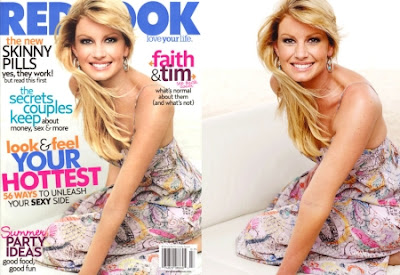Let's journey back to last August, when Katie Couric was about to take over as anchor of the CBS Evening News. The network ran a nice little "welcome aboard" story in CBS Watch magazine, accompanied by the photo on the right. Big (as in about 10 pounds too big) problem: they had already released the photo on the left to the news media months before. Oops.

As the autumn leaves started changing, we also felt some change in the air. In an episode of Ugly Betty, Betty accidentally leaks un-retouched photos of a popular actress. The horror! Despite the fashionista freak outs, the photos are published and in the end it's a feel-good, body image-boosting lovefest. We got all misty-eyed. And we got even more excited when we saw this video, created by the Dove Campaign for Real Beauty:
By spring, there was a whole new variety of digital alteration blooming. It turns out this retouching thing isn't just for the ladies anymore. Andy Roddick got some Incredible Hulk treatment for the June cover of Men's Fitness, which the tennis star himself said was pretty laughable:

And summertime rolled right back around with this Rebook retouching job, uncovered by the intrepid ladies over at Jezebel:

It's been a strange year for retouchers. All this exposure goes against the nature of their jobs. Even the most sought-after retoucher in the world admits that he prefers to work under the radar. “I never want to talk about my work, because it's kind of taboo,'' Pascal Dangin told Kate Betts in a rare 2003 interview. "The people who benefit from my work do not benefit from me talking about it.'' True that. But in our experience, good things happen when taboos are broken. So now that the wrinkles, blemishes, and fleshy parts are out of the bag, will those images of perfection still hold the same power?
When magazine editors and advertisers defend themselves by saying that retouching is an industry standard, consumers should listen closely because they're telling the truth. Up until recently, the biggest problem with this standard was that it was so hush-hush. Thankfully, those days are over. The industry has finally been forced to fess up to the fact that, whether you agree or disagree, this is how it's done.
We talk to a lot of girls and young women in our work, and most of them have heard about retouching. Usually they envision it as something along the lines of the digital pimple zapping they might get for a high school yearbook portrait. What they don't know (and what we find most dangerous) is how frequently it's used in the media--and how extensively. If you haven't already, share everything you know about retouching with the girls in your lives. The sooner, the better.
In fashion and beauty, "aspirational" is a much-used buzz word that translates into the glossy fantasies that are just far enough out of reach to create the kind of longing that sells magazines, moisturizer, and mascara. And it's all fun and games until we start looking at these numbers:
The Supergirl Dilemma, a 2006 study conducted by Girls Inc., reveals that 54% of girls in grades 3-5, 74% of girls in grades 6-8, and 76% of girls in grades 9-12 worry about their appearance.
These worries are just as intense for girls across the pond. According to a new U.K. study, 40% of 14-to-15-year-old girls admitted they don't eat breakfast and 25% of those girls also skip lunch. Over 50% of them listed their appearance as their number one concern in life.
It's time to step back from the chicken or the egg arguments for a second ("We're just responding to consumer and celebrity demands," says the industry. "We're brainwashed to crave those phony images. What we really want is more diversity," say consumers). Whatever you believe, the bottom line is that we adults can analyze, criticize, and form our own logical opinions about the issue. Meanwhile, girls are getting sucked into the perfection obsession at younger and younger ages with little understanding of the difference between fantasy and reality. Retouched images aren't entirely to blame for this crisis, but can anyone honestly deny that they play a role? Here's the question: If retouching continues to be an industry standard, how can we make sure that a responsibility to younger generations is an industry standard, too?








4 comments:
Cant believe they airbrushed Faith Hill's picture, there was nothing wrong in the first place
You hit the nail on the head there Isabella! Nothing wrong with getting rid of some pimples, or even with smoothing out skin discolorations.. But making a beautiful woman look illogically thin??? THAT'S what they need to be getting slapped on the wrist for.
From the beginning of advertising (whenever THAT was) the goal has been to make the consumer dissatisfied with self so said consumer will buy something to fix the dissatisfaction. The solution is to avoid exposure to advertising. Focus on fixing great unrefined food and getting fun exercise. It is amazing how many self-dissatisfaction problems will evaporate!
Joan Ifland joan@sugarsandflours.com
There is never anything wrong with the pictures.
This is madness. Do we ever get to see real women in the media described as 'beautiful'? That's a good question; I dread to think what the answer could be.
Will we end up simply not knowing what women look like?
Imagine a crazy situation when a woman would win great influence on society via the media, but when trying to speak in public, would be absolutely unrecognized. A bit like a medieval-prince-banished-from-kingdom fantasy. Is it really surreal?
Post a Comment